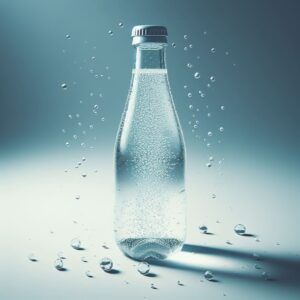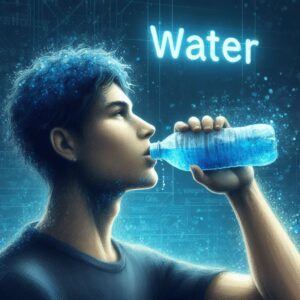In recent years, intermittent fasting has become a popular trend in health and wellness. Many swear by its benefits for weight loss, improved digestion, and overall well-being.
Check out my Intermittent Fasting 101 article here to learn more.
However, one question that may arise regarding fasting is whether drinking water can break your fast.
This post will delve into this topic and explore the relationship between water consumption and fasting.
Understanding Intermittent Fasting
Before determining whether drinking water breaks a fast, it’s essential to understand what fasting is all about.
Intermittent Fasting involves abstaining from food for a set period. The typical method is time-restricted fasting, which involves fasting for 12 to 24 hours or more. The most popular of these is 16:8 fasting. However, other intermittent fasting methods exist, such as Eat Stop Eat and 5:2.
The great thing about intermittent fasting is the variety of choices available to customize your needs. You can learn more about it here.
People tend to focus on the fasting windows, but success with intermittent fasting is achieved through successful and effective nutrition in combination with fasting.
Being mindful of and improving your nutrition is crucial.
The idea behind fasting is to give the body a break from digestion, allowing it to focus on other vital functions like cellular repair, hormone regulation, and fat burning. Many of these functions are enhanced during the periods away from eating.
That is why dividing your routine into fasting and eating windows is essential. You want to gain the effects of fasting due to ruining your fast by eating or drinking the wrong thing.
It is essential to understand whether something breaks your fast or not.
The Role of Water in Fasting

Water is essential for overall health and well-being.
Water is essential for many reasons, including its role as a significant blood component, transporting oxygen and nutrients to cells throughout the body. Staying hydrated ensures these vital substances reach the cells effectively, supporting overall health and energy levels.
It plays a crucial role in various bodily functions, including those of the kidney, liver, and brain.
For example, proper hydration is essential for brain cognitive function, including concentration, alertness, and memory. Dehydration can lead to brain fog, headaches, and impaired cognitive abilities.
Water supports the production of lymph, a fluid part of the immune system, and helps circulate white blood cells throughout the body to fight infections. Proper hydration also helps the body maintain the mucosal barriers in the respiratory and digestive tracts, which are crucial for defending against pathogens.
Staying hydrated is vital for physical performance. Water helps regulate body temperature, lubricate joints, and maintain energy levels. Dehydration can lead to decreased strength, endurance, and coordination.
Staying hydrated is vital to preventing dehydration and supporting the body’s natural detoxification during fasting. Even mild dehydration can lead to fatigue, dizziness, and reduced cognitive function.
Staying hydrated helps maintain energy and mental clarity during fasting periods.
Water is essential for various metabolic processes in the body, including digestion, circulation, and temperature regulation.
During fasting, your body continues to burn calories and produce waste, so staying hydrated helps maintain these processes efficiently.
Drinking adequate water can also help curb hunger and keep you feeling full, making it easier to stick to your fasting schedule.
Does Water Break a Fast?
The short answer is no. Drinking water does not break your fast.
Water does not trigger an insulin response or interfere with the metabolic processes that occur during fasting.
Since water contains zero calories and does not stimulate the digestive system like food does, it does not interfere with the fasting state.
Water is encouraged and often recommended during fasting periods to help keep you hydrated and support the body’s natural cleansing processes.
Benefits of Water During Fasting

- Hydration: Water helps keep your body hydrated, especially during periods of fasting when you may not be consuming fluids through food.
- Maintaining Energy Levels: Water plays a vital role in regulating energy levels. Even mild dehydration can lead to fatigue, dizziness, and reduced cognitive function.
- Supporting Metabolic Functions: Water is essential for various metabolic processes in the body, including digestion, circulation, and temperature regulation.
- Digestive Support: Drinking water can aid digestion and help prevent constipation, which can sometimes occur during fasting.
- Appetite Control: Staying hydrated with water can help curb cravings to avoid overeating when breaking your fast.
- Toxin Elimination: Water plays a crucial role in flushing out toxins and waste from the body, supporting its natural detoxification processes.
- Promoting Skin Health: Hydration helps keep your skin hydrated and can reduce the appearance of dryness, fine lines, and wrinkles.
Tips for Staying Hydrated While Fasting
If you’re planning to incorporate fasting into your routine, here are some tips to help you stay hydrated and make the most of your fasting experience:
- Drink Plenty of Water: Aim to drink at least 8-10 glasses daily or more if you’re fasting.
- Include Electrolytes: Consider adding electrolytes to your water to maintain proper hydration levels and support bodily functions.
- Avoid Sugary Drinks: Stick to plain water and avoid sugary beverages, which can spike insulin levels and break your fast.
- Avoid Artificial Sweeteners: As I covered here, artificial sweeteners can ruin a fast, so you should avoid using them in your water during fasting windows.
- Listen to Your Body: Listen to your body’s thirst signals, and drink water whenever you feel thirsty.
Learn more about staying hydrated while fasting in this article about drinks you can have with intermittent fasting.
Conclusion
In conclusion, drinking water does not break your fast and is highly encouraged during fasting periods.
Staying hydrated with water can support your body’s detoxification processes, aid digestion, and help control hunger cravings.
By ensuring you drink adequate water while fasting and following simple tips for staying hydrated, you can make the most of your fasting experience and reap its many benefits.
Cheers to a hydrated and healthy fasting journey!
Are you unsure if something else ruins a fast? Check out this page to see if it’s already been discussed.
